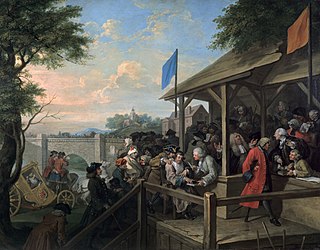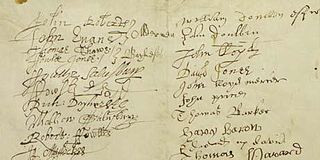
The Parliament of the United Kingdom is the supreme legislative body of the United Kingdom, the Crown dependencies and the British overseas territories. It alone possesses legislative supremacy and thereby ultimate power over all other political bodies in the UK and the overseas territories. Parliament is bicameral but has three parts, consisting of the sovereign (Crown-in-Parliament), the House of Lords, and the House of Commons. Both houses of Parliament meet in separate chambers at the Palace of Westminster in the City of Westminster, one of the inner boroughs of the capital city, London.

The Bill of Rights 1689, also known as the Bill of Rights 1688, is a landmark Act in the constitutional law of England that sets out certain basic civil rights and clarifies who would be next to inherit the Crown. It received the Royal Assent on 16 December 1689 and is a restatement in statutory form of the Declaration of Right presented by the Convention Parliament to William III and Mary II in February 1689, inviting them to become joint sovereigns of England. The Bill of Rights lays down limits on the powers of the monarch and sets out the rights of Parliament, including the requirement for regular parliaments, free elections, and freedom of speech in Parliament. It sets out certain rights of individuals including the prohibition of cruel and unusual punishment and confirmed that "Protestants may have arms for their defence suitable to their conditions and as allowed by law". It also includes no right of taxation without Parliament’s agreement. Furthermore, the Bill of Rights described and condemned several misdeeds of James II of England.

Whilst the House of Lords of the United Kingdom is the upper chamber of Parliament and has government ministers, it for many centuries had a judicial function. It functioned as a court of first instance for the trials of peers, for impeachments, and as a court of last resort in the United Kingdom and prior, the Kingdom of England.

The Petition of Right, passed on 7 June 1628, is an English constitutional document setting out specific individual protections against the state, reportedly of equal value to Magna Carta and the Bill of Rights 1689. It was part of a wider conflict between Parliament and the Stuart monarchy that led to the 1638 to 1651 Wars of the Three Kingdoms, ultimately resolved in the 1688 Glorious Revolution.

The Laws in Wales Acts 1535 and 1542 were parliamentary measures by which Wales was annexed to the Kingdom of England, the legal system of England was extended to Wales and the norms of English administration were introduced. The intention was to create a single state and legal jurisdiction. The Acts were passed during the reign of King Henry VIII of England, who came from the Welsh Tudor dynasty.

The Parliament of England was the legislature of the Kingdom of England, existing from the early 14th century until 1707, when it united with the Parliament of Scotland to become the Parliament of Great Britain after the political union of England and Scotland created the Kingdom of Great Britain.

The Oath of Supremacy required any person taking public or church office in England to swear allegiance to the monarch as Supreme Governor of the Church of England. Failure to do so was to be treated as treasonable. The Oath of Supremacy was originally imposed by King Henry VIII of England through the Act of Supremacy 1534, but repealed by his elder daughter, Queen Mary I of England, and reinstated under Henry's other daughter and Mary's half-sister, Queen Elizabeth I of England, under the Act of Supremacy 1559. The Oath was later extended to include Members of Parliament and people studying at universities. Catholics were first allowed to become members of parliament in 1829, and the requirement to take the oath for Oxford University students was lifted by the Oxford University Act 1854.
The privilege of peerage is the body of special privileges belonging to members of the British peerage. It is distinct from parliamentary privilege, which applies only to those peers serving in the House of Lords and the members of the House of Commons, while Parliament is in session and forty days before and after a parliamentary session.
Strode's Case 3 Howell's State Trials 294 is one of the earliest and most important English cases dealing with parliamentary privilege.

The Oath of Allegiance is a promise to be loyal to the British monarch, and his or her heirs and successors, sworn by certain public servants in the United Kingdom, and also by newly naturalised subjects in citizenship ceremonies. The current standard wording of the oath of allegiance is set out in the Promissory Oaths Act 1868.
The Supplication against the Ordinaries was a petition passed by the House of Commons in 1532. It was the result of grievances against Church of England prelates and the clergy. Ordinaries in this Act means a cleric, such as the diocesan bishop of an episcopal see, with ordinary jurisdiction over a specified territory.

The Protestation of 1641 was an attempt to avert the English Civil War. In July 1641 Parliament passed a bill on 3 May requiring those over the age of 18 to sign the Protestation, an oath of allegiance to King Charles I and the Church of England, as a way to reduce the tensions across the realm. Signing them was a necessity in order to hold public office. Those that were not willing to sign it were also listed under it as refusing to pledge its oath.
In countries with a parliamentary system of government, contempt of Parliament is the offence of obstructing the legislature in the carrying out of its functions, or of hindering any legislator in the performance of their duties.

James I, the first king to reign in both England and Scotland, faced many difficulties with the Parliament of England. Though recent studies have shown that the Parliament of Scotland may have been more of a thorn in his side than was previously believed, James developed his political philosophy of the relationship between monarch and parliament in Scotland and never reconciled himself to the independent stance of the English Parliament and its unwillingness to bow readily to his policies.
The Declaration and Resolves of the First Continental Congress, was a statement adopted by the First Continental Congress on October 14, 1774, in response to the Intolerable Acts passed by the British Parliament. The Declaration outlined colonial objections to the Intolerable Acts, listed a colonial bill of rights, and provided a detailed list of grievances. It was similar to the Declaration of Rights and Grievances, passed by the Stamp Act Congress a decade earlier.

Ashby v White (1703) 92 ER 126, is a foundational case in UK constitutional law and English tort law. It concerns the right to vote and misfeasance of a public officer. Lord Holt laid down the important principle that where there is injury in the absence of financial loss (iniuria sine damno) the law makes the presumption of damage and that it is sufficient to demonstrate that a right has been infringed.
The phrase law of the land is a legal term, equivalent to the Latin lex terrae, or legem terrae in the accusative case. It refers to all of the laws in force within a country or region, including statute law and case-made law.

The Statute of York was a 1322 Act of the Parliament of England that repealed the Ordinances of 1311 and prevented any similar provisions from being established. Academics argue over the actual impact of the bill, but general consensus is that it made the idea that the House of Commons should be consulted on all matters of general interest. The Statute is seen as "the end of a period of revolutionary experiments in English government", with no Ordinances ever attempted again.

The trial of William Laud, archbishop of Canterbury, took place in stages in the first half of the 1640s, and resulted in his execution on treason charges. At first an impeachment, the parliamentary legal proceedings became an act of attainder.

The Protestation Returns of 1641–1642 are lists of English males over the age of 18 who took, or did not take, an oath of allegiance "to live and die for the true Protestant religion, the liberties and rights of subjects and the privilege of Parliaments." These lists were usually compiled by parish, or township, within hundred, or wapentake. They are of importance to local historians for estimating populations, to genealogists trying to find an ancestor immediately before the English Civil War and for scholars interested in surname distributions.